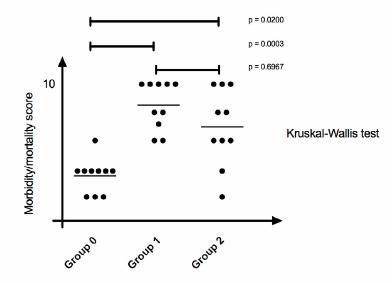Abstract
Purpose:
To evaluate the response of aging rats with sepsis to two different antibiotic regimens.
Methods:
The study was conducted with 30 aging rats (18 month-old) with autologous feces peritonitis. The animals were divided into three groups: Group 0 received no therapeutic intervention (control), while Group 1 received a single dose of 40 mg/kg meropenem and Group 2 received a single dose of 20 mg/kg moxifloxacin. The intervention in both Groups was made 6 hours after induction of peritonitis. The animals were followed up to 15 days for evaluating morbidity and mortality. The weights at baseline were similar in all groups.
Results:
At the end of follow-up, weight loss was significantly greater (p=0.0045) in Group 0 (non-intervention controls). Culture from a blood sample at the end of follow-up was positive in all the animals in Group 0, in two animals in Group 1 and in four animals in Group 2. Morbidity/mortality was significantly higher in Group 0 compared to both Groups 1 and 2 (p=0.003) but the scores were not significantly different between Groups 1 and 2 (p=0.6967).
Conclusion:
Both antibiotic regimens rendered promising results for the treatment of fecal peritonitis.
Key words:
Peritonitis; Carbapenems; Quinolones; Aging; Rats.




